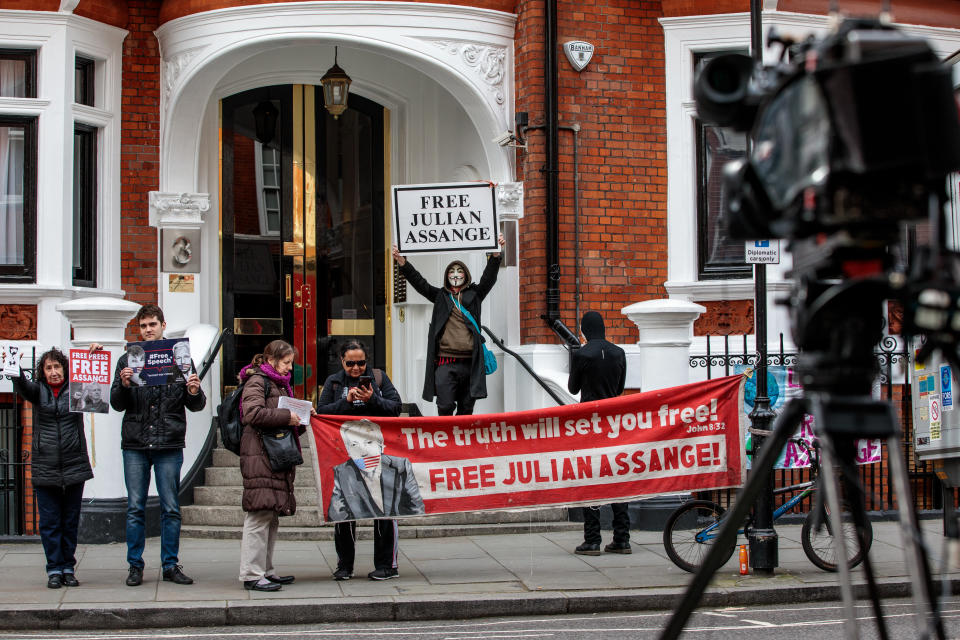Julian Assange charged with conspiracy by US after dramatic embassy arrest
Julian Assange has been found guilty of breaching his UK bail as the proceedings for his extradition to the US are set in motion.
The WikiLeaks founder appeared in Westminster Magistrates Court on Thursday afternoon (local time) to plead not guilty to the charge of breaching bail.
The court heard Assange allegedly resisted his arrest by British police on Thursday, shouting “This is not legal, I’m not leaving” inside the Ecuadorian embassy, where he has held asylum since 2012.
The Australian was dressed in a black suit and shirt with a thick, bushy beard and his hair tied back into a bun when he appeared in court.

His defence team was late to the hearing, so Assange pulled out a book by Gore Vidal and started reading it while prosecutor Erin Watkin left the room to fetch them.
His lawyer, Dan Walker, told the court Assange would not give evidence but had reasonable grounds to not adhere to his bail conditions as he believed he would not be treated fairly by British courts and would be extradited to the US.
Mr Walker said Assange’s belief was “now beyond reasonable doubt” before giving the example of a conflict of interest in his earlier case before Senior District Court judge Emma Arbuthnot, whose husband Tory Lord Arbuthnot had been targeted by WikiLeaks.
“He relies upon previous hearings, and what I submit on his behalf, were compromised hearings that illustrate the unfairness he was subjected to,” Mr Walker told the court on Thursday.

He said his client had been “subjected to a tribunal that was clearly conflicted in its ability to judge Mr Assange impartially”.
District Judge Michael Snow was incensed by the defence case, chiding Assange for choosing not to give evidence but rather make an “assertion about a senior judge” in front of the press.
“He has had throughout senior judges who have looked at his case with great care and his assertion that he has not had a fair hearing is laughable and, I’m afraid, the behaviour of a narcissist who cannot see beyond his own self-interest,” he said.
Judge Snow found Assange guilty of breaching bail but moved his sentencing to the Crown Court as the magistrates court could not sentence him adequately.
Meanwhile the US Department of Justice has charged Assange with conspiring to commit computer intrusion with former US Army intelligence analyst Chelsea Manning in the US in 2010.

The US first requested Assange’s extradition on December 22, 2017, via diplomatic channels.
Judge Snow said Assange could expedite his extradition proceedings if he wished.
“The advantage is that you get over to the United States, resolve this matter and get on with your life,” he said.
Assange responded by sarcastically miming a cheer while giving a double thumbs up.
He is due in Southwark Magistrates Court for sentencing on breaching bail on May 22.
He will appear at Westminster Magistrates Court on May 2 by video link in relation to the extradition case, Britain’s Press Association reports, while the hearing will take place within 65 days.

Earlier WikiLeaks accused Ecuador of breaching international law by withdrawing Assange’s asylum.
“Ecuador has illegally terminated Assange political asylum in violation of international law,” the whistleblowing website.
Ecuador’s President Lenin Moreno insisted he had “asked Great Britain for the guarantee that Mr Assange will not be extradited to any country in which he could suffer torture or face the death penalty”.
– with AFP
Do you have a story tip? Email: newsroomau@yahoonews.com.
You can also follow us on Facebook and stay up to date with the latest news with Yahoo’s daily newsletter. Sign up here.



